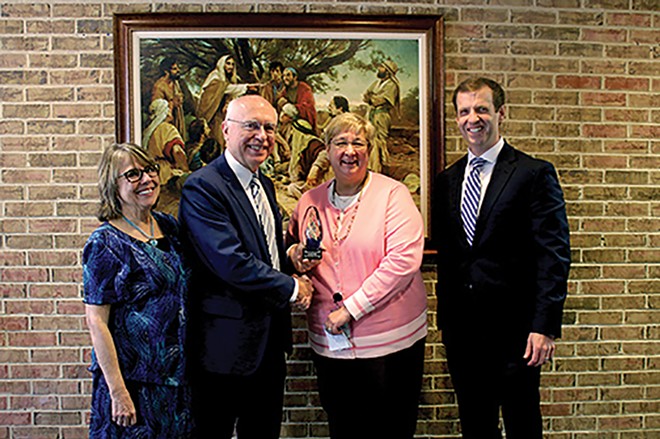
Although he has spent much of his life working in courtrooms and at the Statehouse, David Risley has found a new platform for advocating for criminal justice reform: a podcaster's microphone.
"If things are going to change in the way we approach crime and criminal justice, it won't be working from the top down," he said. "That's like trying to push a rope. You're working on the wrong end. Public perceptions and public opinion that flows from those perceptions has to change. What changes that? By telling stories. It's the way I communicate. Stories need to be told."
Risley was a federal prosecutor in Springfield who focused on prosecuting drug conspiracies in central Illinois. This month, he was admitted into the Senior Illinoisan Hall of Fame.
He was nominated for the recognition by Jon Hansen, who is the evening anchor for WICS-TV and a bishop in Risley's church, the Church of Jesus Christ of Latter-day Saints.
"Just as Jesus Christ gave each of us a second chance, David believes people coming out of prison deserve second chances too," Hansen said.
One of the people Risley prosecuted and sent to prison for 17 years is Lynard Joiner, who was convicted of dealing crack cocaine. Today, Risley and Joiner co-host the podcast "Justice Voices."
Joiner said the show focuses on ways to help folks leaving prison re-enter society. He noted there are many barriers for felons getting jobs, housing, loans and meeting other basic needs.
In future seasons of the podcast, Joiner said they will likely explore other issues such as alternatives to incarceration.
Risley's frustration with the system, which he has been a part of, is readily apparent. He has taken to calling prison "crime college."
"Somehow, we think that justice is punishment, and that if we just punish people enough, we'll get rid of the crime problem," Risley said. "And so, we punish people by sending them to 'crime college' with state-funded tuition, so to speak. And we put them in the concentrated company of criminals, sometimes for a period of years, and we expect them to come out less criminal than when they went in. And they have fewer alternatives because of their felony convictions. But we expect them to go straight."
The 70-year-old Rochester resident added our society needs to rethink how it addresses crime.
Former U.S. Attorney Rodger Heaton described Risley as an accomplished lawyer who has both a great attention to detail as well as the ability to see the big picture.
"He was the leader of the U.S. Attorney's Office's prosecution team for most of the major drug conspiracy cases through the 1990s," he said. "David tried a lot of cases, and as a result of that, he needed to be very capable of handling elaborate detail to actually prove a case beyond a reasonable doubt."
But Heaton said his abilities go well beyond that. He added Risley sees the pitfalls of the criminal justice system and is an advocate for reform.
In fact, Heaton, who also served as former Gov. Bruce Rauner's chief of staff, said he recruited Risley to lead efforts to bring criminal justice reform to Illinois.
It was in this role Risley re-met Joiner, a man who he had successfully prosecuted. But now Joiner was starting a program geared toward helping ex-offenders re-enter society.
The two became friends and eventually began co-hosting the podcast together.
Joiner said he enjoys producing the show with Risley, despite having been prosecuted by the man.
"You can't always hold a grudge against somebody," he said. "There was nothing that Mr. Risley did to me. It was my own actions. He was just doing his job. I went from thinking like a child to thinking like an adult. You have to learn to be willing to accept responsibility in order for you to move on in life. You can't go through life blaming other people for a mistake that you made."
Scott Reeder, an Illinois Times staff writer, can be reached at [email protected].

